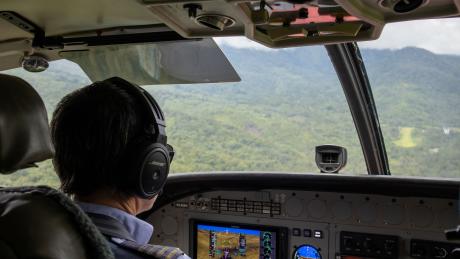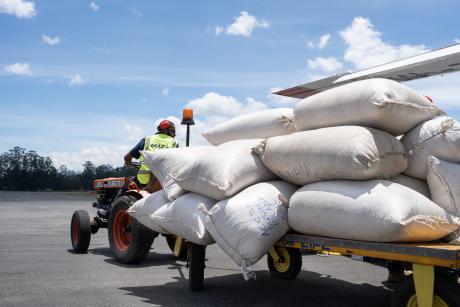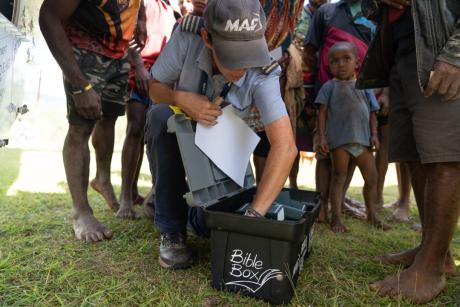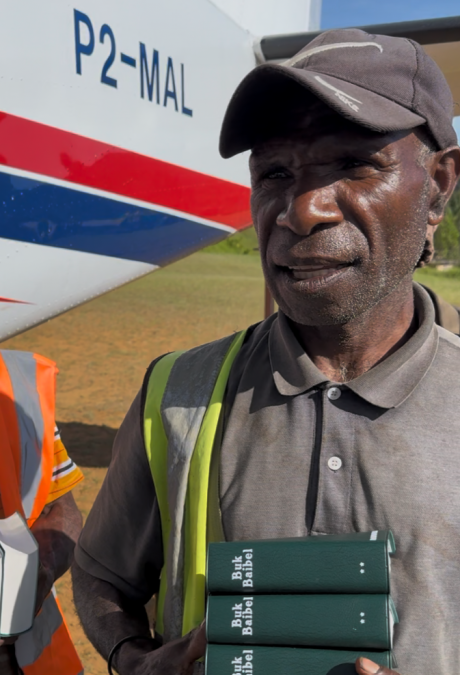
MAF pilot Bridget Ingham describes the many tasks on the ground at a remote airstrip, preparing the plane for a patient transfer flight while also dealing with the economic reality of village life.
Story by Bridget Ingham
“How many coffee bags can you take?”
That was the first question asked of me by Kos, the local MAF agent, when he greeted me as I opened the door after landing at Sengapi. I steeled myself for what lay ahead.
You see, I hadn’t landed at Sengapi to pick up coffee bags.
The notes attached to my flight programme for this particular leg indicated that I was picking up a young girl as a medical transfer patient, who would require a stretcher.
The most important thing about this flight is taking the sick girl.
The airstrip at Sengapi is short, flat and at a high altitude, which means that we are payload-limited for take-off to around 500 kg, or about ten coffee bags. For every passenger on board, that means fewer bags.
I already had three passengers on board whom I had picked up earlier, and of course the patient was my first priority.
“Let me check the plane,” I told Kos,“ and then I will calculate everything and let you know how many coffee bags I can take.”
When there’s a flurry of activity around the plane, I’ll often deliberately ignore it and go through my routine. Check the tyres, wings, propeller, open the doors. As I did so, I started making a mental list of tasks: Take the seats out so the stretcher could fit. Get the stretcher out of the pod and my patient onto it. Calculate how many coffee bags - five. Actually, the coffee would need to be loaded before the patient. But how would I physically fit five coffee bags in the plane with a stretcher? I decided not to take all five.
“The most important thing about this flight is taking the sick girl,” I told Kos. “So, I will take only two coffee bags this time. I can’t fit any more in, otherwise they might fall on her. I will take the seats out, then put the stretcher harness in, then load the coffee, then load the patient. All right?”
These matters are essential for the economic viability of remote PNG communities, bringing help for families as well as the hope and healing that a medical transfer gives.
He nodded and I set to work. There were plenty of willing volunteers, but some tasks were easier for me to do myself rather than try to explain how the equipment worked.
With the two coffee bags and my patient on board, I calculated the cost of the fares and freight.
Kos handed me the money, mostly in K20 notes and smaller. “This is for the patient and guardian. This is for the other passenger. This is for the coffee.”
I started counting it, but Kos wasn’t finished. “I have fifteen more coffee bags to go to Hagen, one passenger for Madang. Three passengers next week for Goroka. And I want to buy lots of Bibles. How many do you have?” He had seen the Bible box in the cargo pod.
“Kos, you need to not talk to me while I am counting the money,” I said. “Be quiet. Otherwise I have to start again.”
I noticed that the sick girl was getting a bit restless. Knowing that it was going to be a while before we took off, I asked the crowd of people, “Where is the person travelling with her?” A woman came forward. “Can you please come up, sit with her and hold her hand?”

After I had finalised the flight paperwork, I had Kos on one side asking for Bibles and a group of onlookers asking if they could change their money for newer notes. I did the best I could with what I had, and in the blink of an eye, swapped from mobile banking service to Bible distributor. Kos handed me 200 Kina for the ten Tok Pisin Bibles that I had. Other people bought Bible comics. My box was nearly empty.

“When you come back next week, bring twenty more Bibles,” Kos told me.
I started closing the doors, told the woman who had been sitting on the floor with the sick girl to sit in the seat closest to her, and helped her put her seatbelt on. My other passengers boarded, and I gave a quick safety briefing before praying for the sick girl and our flight to Hagen.
Just before I climbed into the cockpit, Kos had one last thing to tell me.
“Remember I have fifteen more coffee bags for Hagen, one passenger for Madang, three for Goroka.”
These matters are essential for the economic viability of remote PNG communities, bringing help for families as well as the hope and healing that a medical transfer gives.
This was not just one day, but one landing, in the life of a MAF pilot / ticket officer / Bible seller / cargo handler / {insert other roles here}!
